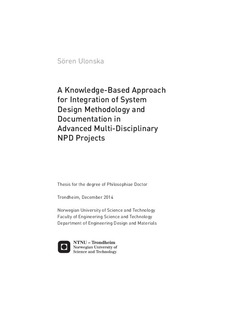| dc.contributor.author | Ulonska, Sören | |
| dc.date.accessioned | 2015-02-18T11:46:58Z | |
| dc.date.available | 2015-02-18T11:46:58Z | |
| dc.date.issued | 2014 | |
| dc.identifier.isbn | 978-82-326-0662-7 (printed ver.) | |
| dc.identifier.isbn | 978-82-326-0663-4 (electronic ver.) | |
| dc.identifier.issn | 1503-8181 | |
| dc.identifier.uri | http://hdl.handle.net/11250/276639 | |
| dc.description.abstract | New product development (NPD) performance depends both on developing new
knowledge as well as on leveraging existent knowledge inside an organization. In
project-based NPD execution knowledge is often created without a clear reuse
strategy and subsequently misplaced by storing it in project-related, disjointed
knowledge repositories. Thus, valuable information is most likely not utilized and
has limited value for organizational learning. One possible countermeasure is to
establish a strategic, dynamic knowledge standard that spans all of an organization’s
projects and enables reuse of valuable knowledge with being simultaneously flexible
to novelty and product evolution.
The goal of this work has been to investigate the deployment of strategies, tools and
methodologies to capture, structure, and utilize valuable product engineering
knowledge in order to establish a framework for implementing a strategic,
knowledge-based approach, which can contribute to establish a dynamic knowledge
standard. The research has been conducted in several learning cycles through a
combination of literature reviews and case studies. The literature reviews,
considering the fields of engineering design, systems engineering, lean product
development, and knowledge management were directed towards theories, tools,
methodologies, and processes that address knowledge-related engineering and
management aspects. The case studies have been conducted in product engineering
companies an industrial product engineering environment. All case companies
develop knowledge-intensive, high-technology products in multi-disciplinary teams
with project-based NPD execution.
Overall, the work has several outcomes. The first outcome is an exploration of the
current knowledge transformation practices in the case companies, which revealed
the needs for an engineering-driven framework for knowledge-based product
development. Further, a product mapping methodology for evaluating the disjointed
product portfolio is explored, providing a practical, qualitative way of transforming
fragmented product variant information into visual overviews. The third outcome is
an investigation of the role of A3-reports as potential documentation tool,
discovering that A3-reports can contribute positively to reuse of company-internal
documentation. Finally, a strategy to develop a structural knowledge standard, based
on a modular architecture and a strategy to develop a declarative knowledge standard
based on A3-reports and causal diagrams are investigated.
Although this work has substantially increased the body of knowledge towards the
development of a dynamic knowledge standard, further research is required for
implementation, including the establishment of an integrated (structural and
declarative) dynamic knowledge standard as well as exploring adequate routines for
product evolution. | nb_NO |
| dc.language.iso | eng | nb_NO |
| dc.publisher | NTNU | nb_NO |
| dc.relation.ispartofseries | Doctoral thesis at NTNU;2014:373 | |
| dc.relation.haspart | Paper 1:
Sören Ulonska; Torgeir Welo.
Need Finding for the Development of a Conceptional,
Engineering- Driven Framework for Improved Product
Documentation.
Procedia Computer Science no. 16 (0):423-432.
<a href="http://dx.doi.org/ 10.1016/j.procs.2013.01.044 " target="_blank"> http://dx.doi.org/ 10.1016/j.procs.2013.01.044 </a>
Copyright © 2013 The Authors. Published by Elsevier B.V.
Under a Creative Commons license CC BY-NC-ND | |
| dc.relation.haspart | Paper 2:
Sören Ulonska; Torgeir Welo.
On the use of a product portfolio map and variant maps as a
tool to enable platform-based manufacturing strategies | |
| dc.relation.haspart | Paper 3:
Sören Ulonska; Torgeir Welo.
A3-reports as tools for supporting organisational learning
and knowledge reuse: A comparative survey-based study | |
| dc.relation.haspart | Paper 4:
Sören Ulonska; Torgeir Welo.
Strategies for implementing a dynamic knowledge standard
in product engineering using structural representations and
knowledge artifacts | |
| dc.relation.haspart | Paper 5:
Ulonska, Sören; Welo, Torgeir.
New Perspectives in the Quest for Unification of 'Lean' with Traditional Engineering Design Methodology. I: Proceedings of the 23rd CIRP Design Conference, 2013 The final publication is available at Springer via
<a href="http://dx.doi.org/ 10.1007/978-3-642-30817-8_2 " target="_blank"> http://dx.doi.org/ 10.1007/978-3-642-30817-8_2 </a> | |
| dc.relation.haspart | Paper 6:
Sören Ulonska, Cecilia Haskins, Oluf Roar Bjørset Tonning; Itxaso Yuguero-
Garmendia. Keep Systems Engineering Simple to Get the Job Done - 23rd Annual INCOSE International Symposium | |
| dc.relation.haspart | Paper 7:
Krogstie, Lars; Ulonska, Sören; Welo, Torgeir; Andersen, Bjørn.
On Knowledge-based Development: How Documentation Practice represents a strategy for Closing Tolerance Engineering Loops. Procedia CIRP 2014 ;Volum 21. s. 318-323
<a href="http://dx.doi.org/ 10.1016/j.procir.2014.03.156 " target="_blank"> http://dx.doi.org/ 10.1016/j.procir.2014.03.156 </a>
© 2014 The Authors. Published by Elsevier B.V.
(CC BY-NC-ND) | |
| dc.relation.haspart | Paper 8:
Ulonska, Sören; Welo, Torgeir.
Product portfolio map: a visual tool for supporting product variant discovery and structuring. Advances in Manufacturing 2014 ;Volum 2.(2) s. 179-191 - Is not included due to copyright available at
<a href="http://dx.doi.org/ 10.1007/s40436-014-0077-y " target="_blank"> http://dx.doi.org/ 10.1007/s40436-014-0077-y </a> | |
| dc.title | A Knowledge-Based Approach for Integration of System Design Methodology and Documentation in Advanced Multi-Disciplinary NPD Projects | nb_NO |
| dc.type | Doctoral thesis | nb_NO |
| dc.subject.nsi | VDP::Technology: 500::Industrial and product design: 640 | nb_NO |

